Last Updated on June 20, 2024 by Michelle
Yes, New England is a mission field. But truth be told, everywhere is a mission field, and so many people need to know about the Kindness of God, in a broken, hurting world. After you read this article, join my friend and pastor, Nate Pickowicz, and I as we discuss exactly that. Listen in to episode 100 right here or join us here:
Why is New England a Mission Field?
Is New England a mission field? Is the gospel all but forgotten in the very place where the Puritans fled to for the sake of preserving it?
As a rather new transplant to New England, and a daughter of the true King (not the tyrant the Puritans were fleeing), I love the Good News. The gospel, which makes it clear that we serve a sacrificing Savior who wants a personal relationship with each of us, all failures in our own right, well, it changed my life.
No, let’s make that present tense. It’s continually changing my life, even in the midst of my continual failures.
Recently on Instagram I shared some stories of our old, dilapidated, but in-the-state-of-repair-and-rebuilding New England church. And so many started asking me questions. Questions about our preaching and theology (exegetical and expository, and reformed) where we were located (the heart of central New Hampshire) and if it was true that where I lived was a mission field where a huge percentage of the inhabitants are nonbelievers.
That last question is one I got a LOT that day.
So I asked folks if they’d like to know my thoughts on this… on why New England has become a mission field. I got more response to that little question than maybe anything I’ve asked on instagram, and this little article is my answer.
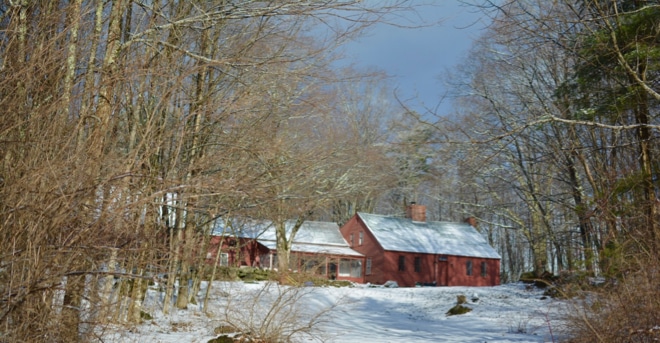
New England Front Doors
When we moved to New England 8 years ago, from the mid-Atlantic area, we quickly noticed an odd thing about the homes. Almost every front door is either obstructed, seemingly nonexistent, or unused.
Our own home was no exception. While the main door, right in the middle of our double cape home, opens up to a curving set of stairs that reveal a 2-story chimney, made of old, chipped, romantic brick, this door was never used by the previous owners, They had a large, ugly, handmade box that stood taller than the first stair landing, piled high with wood for stocking the wood stove. This built-in, 6-ft-tall wood box made opening the front door treacherous at best. (Read more about our old farmhouse, built around 1800, here.)
The first hour of owning our new, 200-plus-year-old, home, that giant wood box was in the front yard and partially disassembled.
I was determined that every guest who came to our home would absolutely be greeted at the front door.
But I was disheartened. Everyone who visited would walk right past the front door and knock on our secondary door; the door that would have opened into the carriage house back in 1800, a sort of entrance to the barn, which is attached to our old farmhouse.
Except the census survey gal and the furniture delivery guys. They both knocked on the front door. But maybe they’re instructed they have to go the the main door? Plus, the delivery guys had driven their truck from NJ. They weren’t locals.
You see locals know how to immediately evaluate which door is the “used” door.
My good friend, and boss, and pastor, explained this phenomena to me the first Christmas we lived in New England. I had just told Nate that the girls and I, and a few church friends, were going to make and deliver cookies to houses in town to say “Merry Christmas” and invite everyone to our candlelight Christmas Eve service.
Nate explained that I need to be careful to not bother folks by knocking on an unused front door but look for the “family door.” He assured me l’d get the hang of recognizing which door this was, explaining a bike left on the ground by the door, or a trail of toys, or just the worn look of the grass leading to it, would disclose the family door. But it would almost never be the actual main, front door on the home.
In some ways, this phenomena weeds out the folks who aren’t welcome. Those who are truly welcome know the right entrance. If someone knocks on the front door, you can let the dogs bark and ignore them. But don’t write off these front-door-blockers as total jerks. We’ll get back to that…
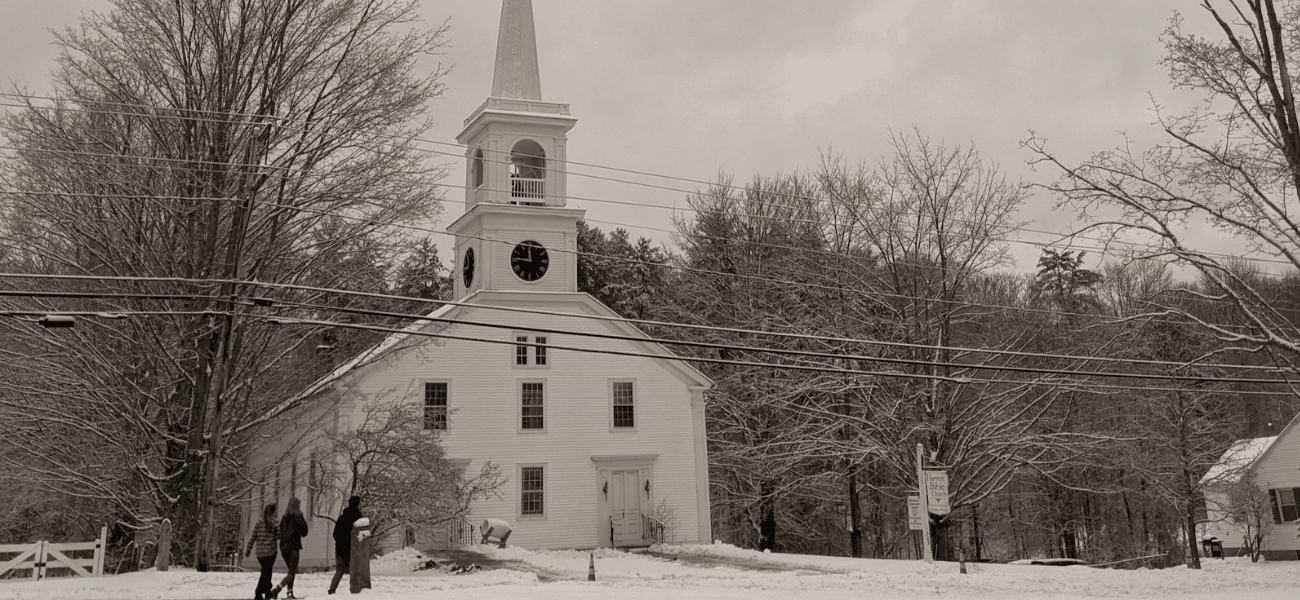
New England’s Coldness
While New England is a natural wonder of beauty, with rolling mountain ranges and lush green fields bordered by deep hardwood forests… while New England is a daily natural fingerprint of a merciful loving creator… it’s also cold. Cold with long winters, and cold with closed hearts.
I had no idea when we moved here that New Englanders are considered, by many standards, to be a “lost people,” a mission field in need of the gospel.
I don’t follow gallop poll results, or I would have known. Gallup polls placed the six states of New England in the top ten least religious states in the nation.
Then a separate Gallup poll brought it eerily close to home and obvious that here in New Hampshire we live in the least churched state in the nation.That poll discovered that, among all 50 states, the least self-proclaimed “religious” people live in New Hampshire (tied with our next-door-neighbor Vermont).
And according to the Glenmary Research Center, those in New England who attend evangelical churches hovers between 1 and 3% of the population. I’d venture to say, from what I’ve personally witnessed, that percentage is even lower–maybe even less than 1 in 100–post-Covid.
But how can this be? Why are hearts so cold here, here where the Puritans first set up a “city on a hill” to be a beacon for the gospel?
This is something I’ve thought about a lot, and talked with Nate about (after he taught me about the family door). Nate wrote a popular book on this topic, Reviving New England, that I highly recommend.
Now that I’ve been a New Englander for a while, I think New England states filled up so much of the tops slots of that 2009 gallup poll because folks up here often refuse community and conformity.
I can’t say I blame them. Winters are seriously long, cold, and dark, and one gets used to curling up inside by a warm fire and never venturing out (especially when there are multiple feet of snow on the ground). So being invested in community is hard. And it gets harder with every winter that passes.
I also think often about those pioneers who ventured out from Plymouth 300 years ago and tried to make a life in the New Hampshire wooded mountains. They had to brave huge difficulties, not to mention move huge rocks… seriously, have you seen the foundation of an old New England farmhouse? They couldn’t be cut from average cloth. They were tough, at least the ones who survived. So New Englanders have been rejecting conformity, and forging into the darkness, and dealing with heavy rocks, for a long time.
These amazing people have breed individualistic, nonconformist generations, and understandably so.
But those tendencies, I think, are why we face a lack of the gospel here in New England today. Let me explain…
New Englanders Struggle to Embrace Community
We like to go solo.
Or at least closely guard our inner circle.
We don’t have a need for a welcoming front door, because those few folks who are truly welcome know the right entrance.
I should stop here and explain that I also have figured out that all of the old farmhouses here have other justifications for this. And by “old” I really mean it.. I’m not talking the “old” homes built in 1955 in the Mid-Atlantic area we moved from, but “old” homes that were built when George Washington was still alive. Our home was built, the nearest we can figure, around 1800. The true front door on an old Cape Cod farmhouse often just doesn’t work well, or is exposed to the elements and hard to get in when snow is piling up, or it needs to be blocked by furniture inside since old New England homes are also rather small, which was necessary when early settlers were trying to stay warm to survive the winters.
So know that just because a neighbor has blocked off their front porch does not mean I feel unwelcome there, but it drew quite an analogy in my still-mid-atlantic-front-door-loving mind back when I was first questioning how New England ever became a missions field.
Can’t we be reclusive & still embrace the gospel?
If we’ve convinced ourselves our whole lives that we are strongest on our own and have no need for other’s help or friendship, then we have no reason to foster community.
But the gospel insists on community. We’re told in Galatians 6:2 “Carry each other’s burdens, and in this way you will fulfill the law of Christ.” You can’t carry others burdens if you don’t spend time with them and know them. And in Hebrews 10:25, we’re told to “not abandon our own meeting together, as is the habit of some people, but encourage one another; and all the more as you see the day drawing near.”
Afterall, the gospel, by its very nature, insists that we share it. We can only do that in community. We can’t “proclaim the gospel to the whole creation” (Mark 16:15) if we don’t like to leave our warm home or open our front door to a stranger.
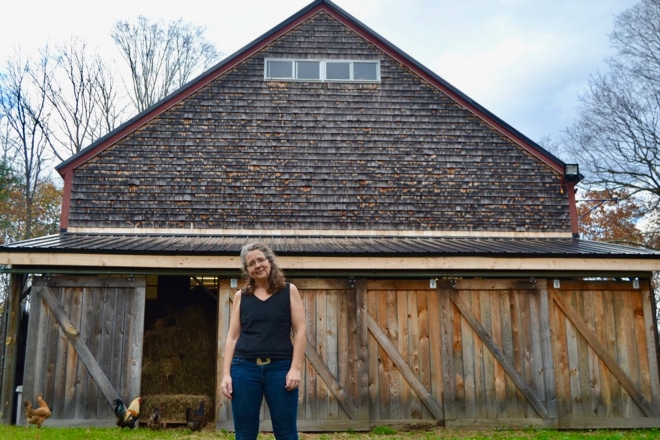
New Englanders Struggle to Conform on any Topic
The first New England settlers understood that conformity to the world’s standards is something to flee from–even across a treacherous ocean.
Yet, today, “New England pulpits have been hijacked! They were once filled with the preaching of the Word of God, but now they are filled with the shifting opinions of sinful men. This is a tragic thing!…It is from the pulpit that God speaks to His people through His word, so when His voice is removed and replaced with another, the church is quickly led astray.” (from page 19, Reviving New England, by Nate Pickowicz)
Aren’t believers called to be nonconformists?
While we are told, as Christians, we will not be befriended by the world, and while that makes us outsiders and nonconformists by nature, we’re refusing to conform to the world’s ideologies and repetitive sins. But, you see, at the same time we are eager conformists. We are trying to conform to His likeness. To His laws. To His desires for us. To the desires He has placed in our hearts. We’re working at conforming to His plans for us, not our own.
When I was trying to decide what to title this article I did what I always do… I googled some things to see what phrases folks are searching on this topic.
When I googled “Is New England a Missions Field” and scrolled down a little I came across a article written by a Congregational pastor who refers to herself with the pronoun “them” and insists that laws restricting the killing of babies in the womb are dangerous, just to name a few areas in her life where she is not living a life in line with scripture. But “Em” is a pastor who stands in a pulpit in New England every Sunday. And she (like many others who grace New England pulpits, preaching politics of acceptance, void of the need of a Savior) insists the gospel is alive and well in her beloved New England and resents anyone “calling our neighbors sinners.”
But you see, Em, that’s how I know the gospel is almost squelched here in what is also my beloved New England.
Inherent in the good news of the gospel is the fact that His rules and laws (including ones related to marriage and life in the womb) are in place for us to try to follow because He wants us to have life, and have it to its fullest possibility. (John 10:10) That can only happen when we define sin and put on the full armor of God to fight it.
If we truly love our neighbors, we want them to have life to its fullest, and that doesn’t happen in a life that is deep in unrecognized sin.
So, yes, Christians need to be nonconformists to the world, but New England is filled with people who, for generations, have worked at being nonconformists of a different mold. Cold nonconformists who stubbornly worship individualism and independence above all else.
In fact, individualism and nonconformity are New England’s gods of the 21st century.
So does our family use our front door?
As for our front door? I gave up. In the beginning I’d intentionally open the front door when guests pulled up our long drive and I would beacon visitors from where they stood, on the side porch, to come enter through the front door. But it made folks uneasy. Then I realized when I have a rug in the entranceway I couldn’t open the old door all the way anyway. So I gave up.
But I’ll know when it’s time for a new national census. She’ll knock on my front door.
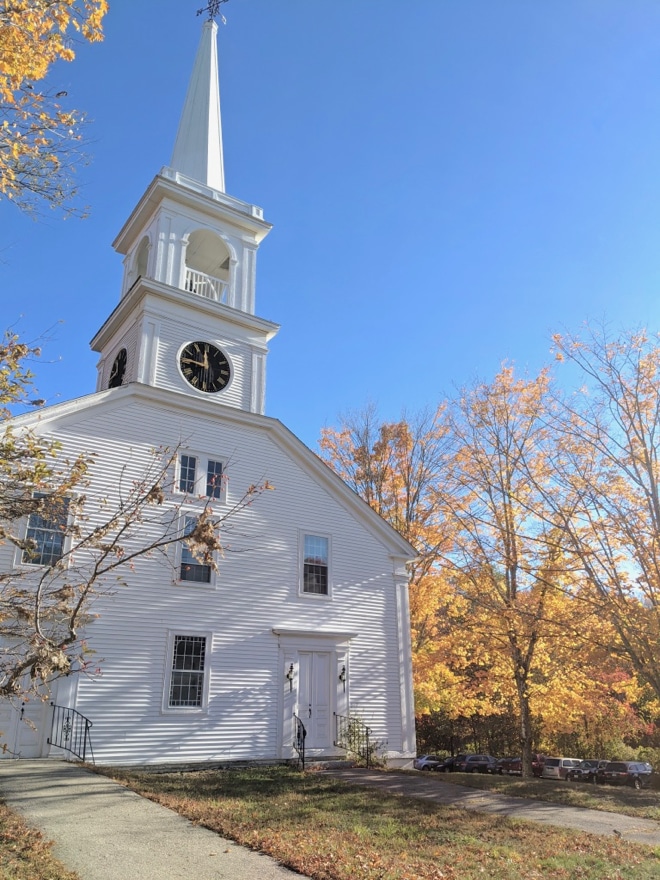
If you’d like to know more…
I have so much more to say on this topic…
Watch for a future article(s) on this topic, diving into:
- The biggest problem churches face in an area when people are not invested in a community.
- The biggest problem housed in New England pulpits.
- The heresies heard weekly from New England pulpits, and
- The hope I have that more gospel-centered churches will be dotting New England horizons in years ahead.
- Some thoughts of why NH ranks where we do on the gallop poll listing of “most sinful” states (45th).
- And, also, how our church is doing things differently, with a long-view and what that looks like.
Find out more about the little church I’m active in, and where I serve as Assistant to the Pastors, in the video below.
We are a humble church, striving to do big things for the gospel, here where hearts are sometimes as cold as the winters: https://www.hbc-nh.org/giving/
Talk to me!
If you have any questions, leave a comment below. And please tag me on ig @souly.rested.
More Encouragement For You:
4 Questions Successful Parents Ask Themselves Often
Let us acknowledge the LORD; let us press on to acknowledge Him. As surely as the sun rises, He will appear; He will come to us like the winter rains, like the spring rains that water the earth. Hosea 6:3
Pin this for later!
Click on the image below to pin this post & save it for later.
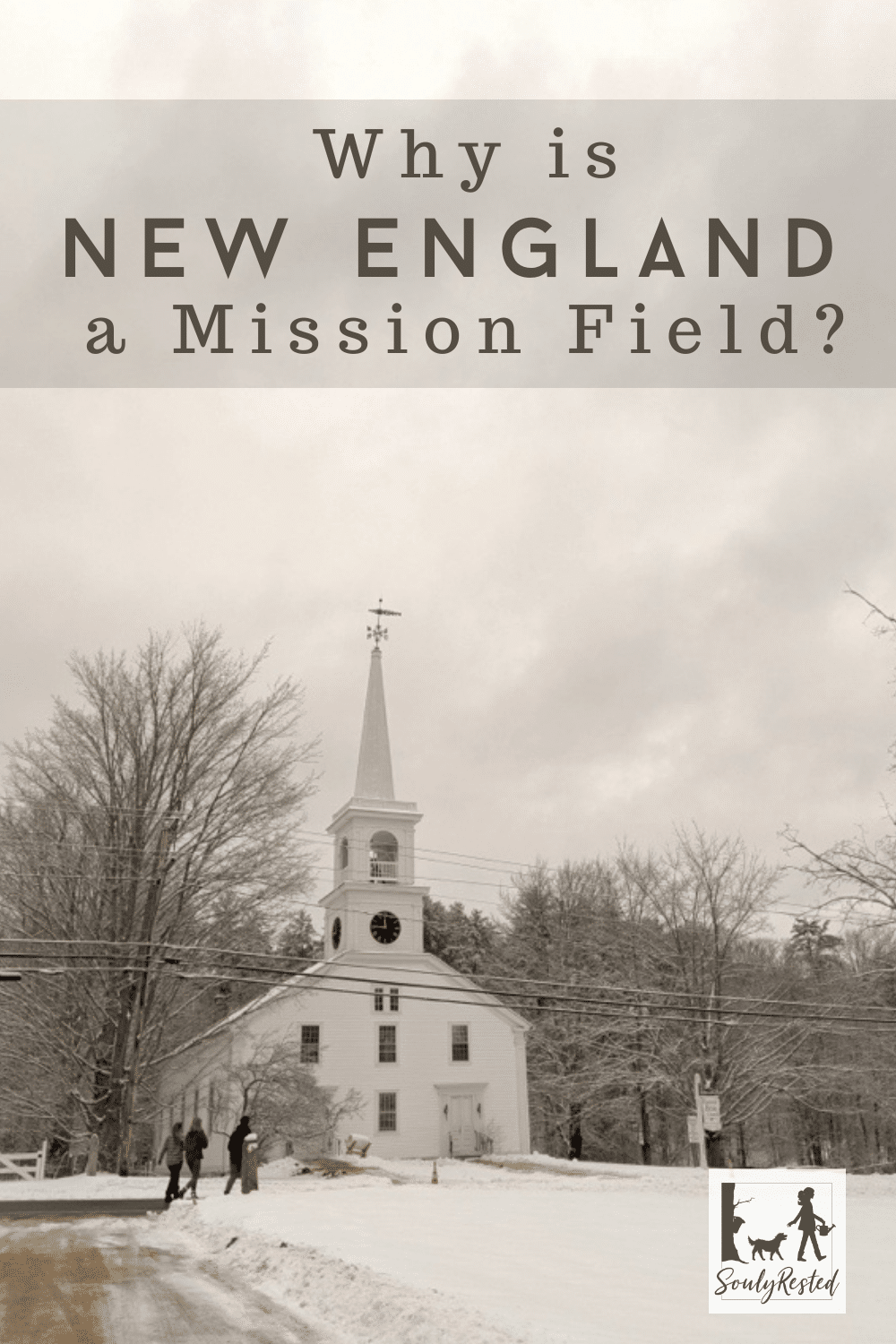
Find out why SoulyRested was considered to be one of the Top 20 Must-Read Homesteading Blogs of 2018 and then one of the Top Homesteading Blogs of 2021 as well.
Glance at my Resource Page if you’d like to get a glimpse of all the supplies I use and recommend for everything from gardening, to homeschooling, to chicken care, to nature journaling, to maple syrup making.
I’d love to connect!
To find me in some other neck of the woods, just click any (or every!) icon below:

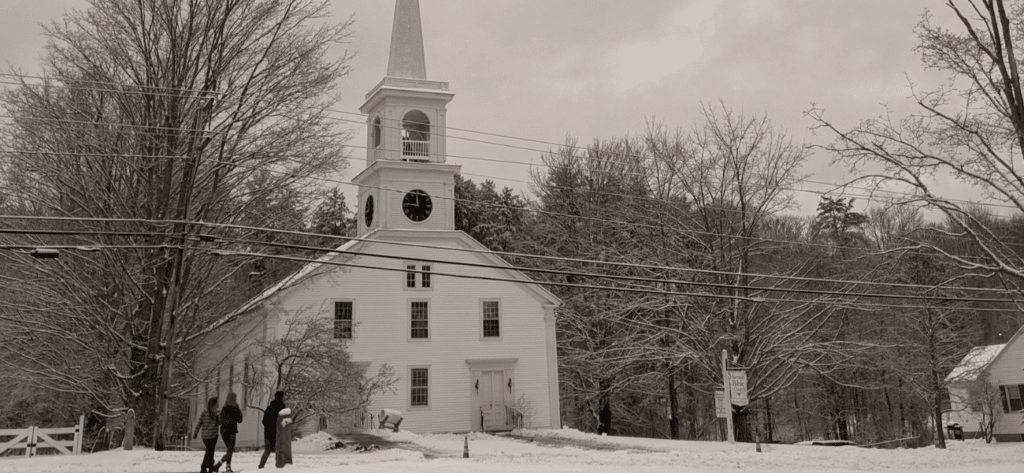





New Hampshire native and pastor’s wife here, doing mission work in an old New England church that saw numerous revivals in past centuries. The old wells that have been filled in can be re-dug if He is the one who sends us. I lean on the fact that we are still here and God has people to save here in New England. May He pour His Spirit out onto souls, ignite hunger and turn them to Christ.
And, yeah, if you use the front door in New England, you’re probably a stranger. Even my mailman opens my garage door to put packages inside!
our mailman does the same, but on our screened side porch. 🙂 Nice to meet you, fellow worker in the field. <3
America is the mission field. We live and minister on the streets and market places of the southeast and can tell you from experience that the two most dangerous places in our country is now the Womb and the brick and mortar Church. In fifty years of knowing Him we have never witnessed such widespread paganism. This is truly the Laodicean church age. We ask people a simple question when sharing the Gospel, “Are You Born Again?”, and almost, the exclusive answer is either, “I’m Baptized” or “What Is Born Again”. We have a call-in Bible study that is Prophecy centered and is a book by book continuous study. The people that have joined us from five states have been members of evangelical churches for many years, yet their Bible knowledge is so shallow we are amazed. The mission field is all people, Christians and pagans, the field is white for harvest. Maranatha
Regarding the phrase “missionary field” my query is completely different. I am a historian in a small Vermont town. I came across the following while trying to resolve the provenance of a piece of land in town. The description of a piece of property reads, “being land deeded to Simon Stevens by George Greenbank called the old orchard and missionary field.” The transaction is dated August 17, 1864. What might a piece of land known as “the missionary field” have been used for? According to the current owner, this same piece of land wraps around a cemetery, and there is an old fence back there. Another exception regarding this piece of land on which there is the so-called old orchard and missionary field reads, “except the old graveyard is to remain as a public graveyard—as now fenced” (28 October 1864). What is a “missionary field” in this context? Please reply to my email address speakvt@sover.net
interesting question, but I’ve never heard this term used any other way. I have no idea, I’m afraid.